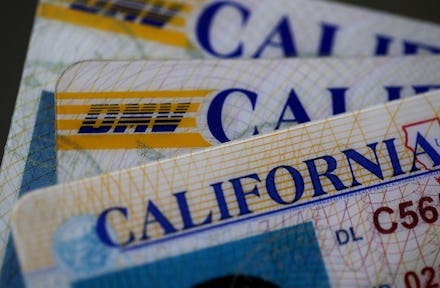Amid controversy about Trump’s “voter fraud panel,” new study sticks up for motor voter law

In the eyes of its critics, President Donald Trump’s Commission on Election Integrity isn’t really about defending the bedrock American tradition of “one person, one vote,” as Vice President Mike Pence put it.
Instead, watchers say the panel’s real endgame, thanks to Vice Chairman Kris Kobach of Kansas, is a full-on assault on the 1993 National Voter Registration Act.
The intent of the act, also known as the “motor voter law,” was simply to make it easier for people to register to vote.
A new study called “Accelerating the Vote” — produced by the public policy group Demos and shared exclusively with Mic — suggests more states are complying with the law and registering more voters than in years past.
“We were alarmed by the recent letters to states both from the Kobach Commission and the Department of Justice requesting information on voters and voter purge practices. This administration seems to be only concerned with the voter-removal portions of the National Voter Registration Act. This is misguided at best, and nefarious at worst,” Demos Senior Counsel Stuart Naifeh, author of the report, said via email.
“There are over 53 million eligible people who are not registered to [vote] in the United States. This report demonstrates that the motor voter provision of the NVRA — quarter-century old bipartisan legislation — when complied with is an effective tool to register eligible voters.”
A federal judge last month fined Kobach $1,000 for deceiving the court about documents he brought to a meeting with Trump shortly after the 2016 election. The documents appeared to be related to amending the motor voter law.
But why would the White House be interested in such a move? As election-law expert Michael McDonald of the University of Florida recently told Slate, the NVRA blocks states from implementing tough new registration requirements or kicking people off the voter rolls for missing elections: “If Kobach can persuade Congress to amend the registration procedures outlined in the NVRA, then Kansas — and other states — can demand that voters show documentary proof of citizenship, like a birth certificate or passport,” McDonald explained.
The new Demos report, which is a follow-up to a 2015 study, “Driving the Vote,” says the signs are encouraging regarding the effectiveness of motor voter in states that have made reforms.
In Connecticut, for example, average monthly registrations hit 8,671, up from 856 per month in the two years prior to the 2012 election.
In California, DMV-originated registrations went up to “41,918 per month from April through October 2016, from an average of 27,404 per month in the same period in the 2012 presidential election cycle.”
Some of the reforms were common-sense time-savers, the report said: “For example, Montana has gone from using separate driver’s license and voter registration applications to incorporating licensing and voter registration into a single form.”
Not every state has seen dramatic changes, per Demos: North Carolina got singled out for having a DMV resistant to reform, even in the face of legal action.
Naifeh said overall, “We are proud of the progress some states have made and are optimistic that after seeing how effective these reforms can be to get more voters on the rolls, more states will seek to comply. For our democracy to thrive, the freedom to vote must be protected for all citizens.”
The Commission on Election Integrity meets for the first time in Washington, D.C. on July 19.